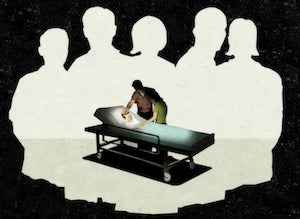LENS Health and Wellness
Easing the Burden
Providing Coping Strategies for Families with Technology-Dependent Children
 IMAGE: BRIAN STAUFFER/THEISPOT
IMAGE: BRIAN STAUFFER/THEISPOTOne mother kept a nightly solo vigil after her infant's ventilator tube disconnected, resulting in a terrifying emergency room visit. A beleaguered couple alternated sleepless night time shifts for similar reasons—though their tube-fed daughter had become a teenager.
For many families caring for an estimated 600,000 children in the United States who require life-sustaining technology—such as ventilators, oxygen or IVs—these are likely familiar and sometimes fearful stories.
Now, with a $500,000 National Institute of Nursing Research grant, a Case Western Reserve nurse scientist is collaborating with University Hospitals Cleveland Medical Center to study whether a colleague's copyrighted program, known as "Resourcefulness Training," could help make a difference for these parents.
"These families are caring for children with complex problems—children who often need significant help, sometimes for decades to come," said Valerie Boebel Toly, PhD, RN (NUR '90; GRS '09, nursing). She is an assistant professor at the Frances Payne Bolton School of Nursing and has spent a decade providing such families self-help tools to better manage the added stress in their lives.
The resourcefulness program includes common-sense, but not-always-used, activities such as journaling, reframing a situation in a positive light and accessing help from others. It was created more than 20 years ago by Jaclene Zauszniewski, PhD, RN (NUR '89; GRS '92, nursing), the Kate Hanna Harvey Professor in Community Health Nursing.
Zauszniewski's program has helped family caregivers tending to elderly parents or spouses with dementia, or women caring for their grandchildren. Given the track record, Toly wanted to evaluate the impact on parents of technology-dependent children.
"Having these skills in a toolbox of sorts can make an unimaginable difference," she said.





